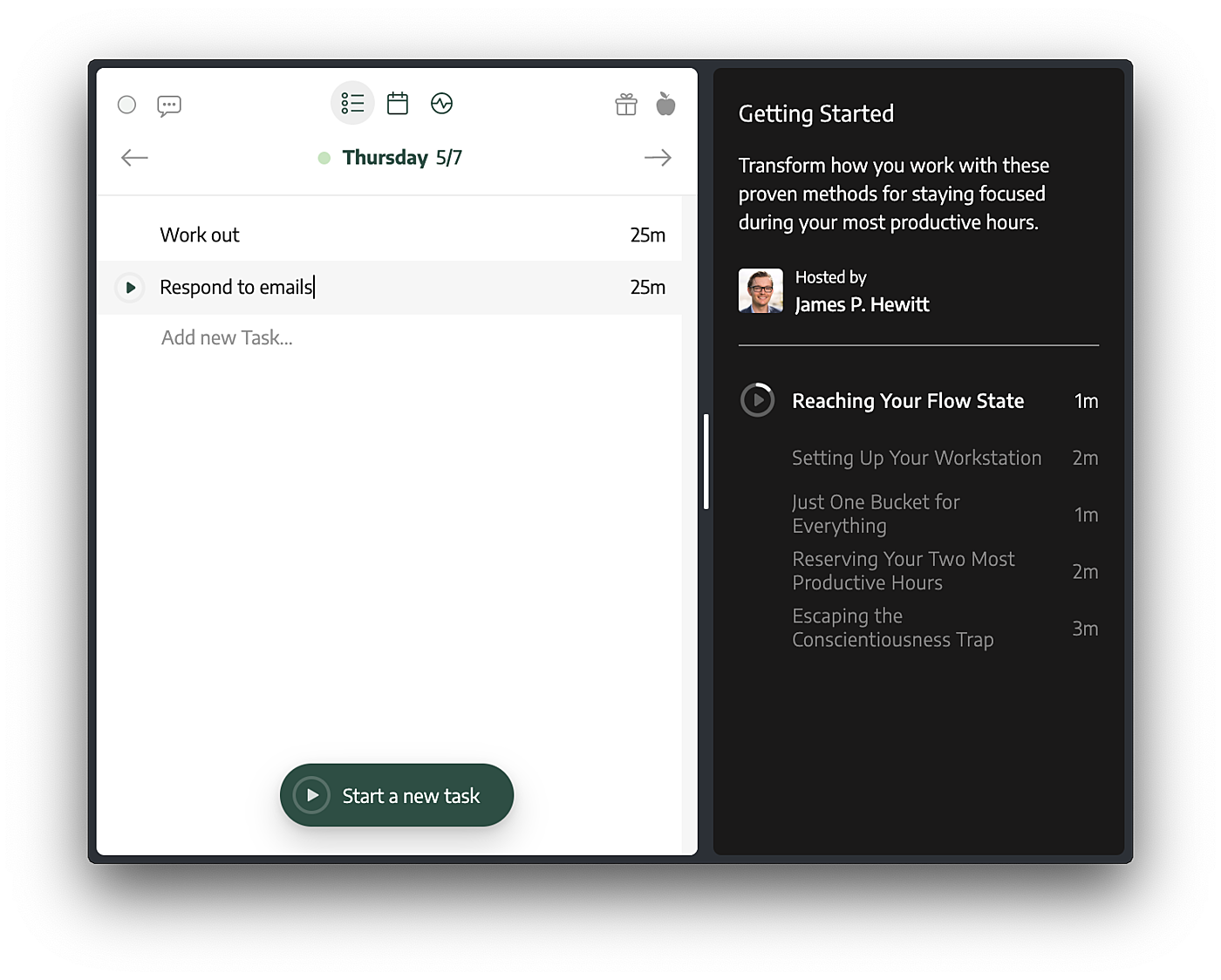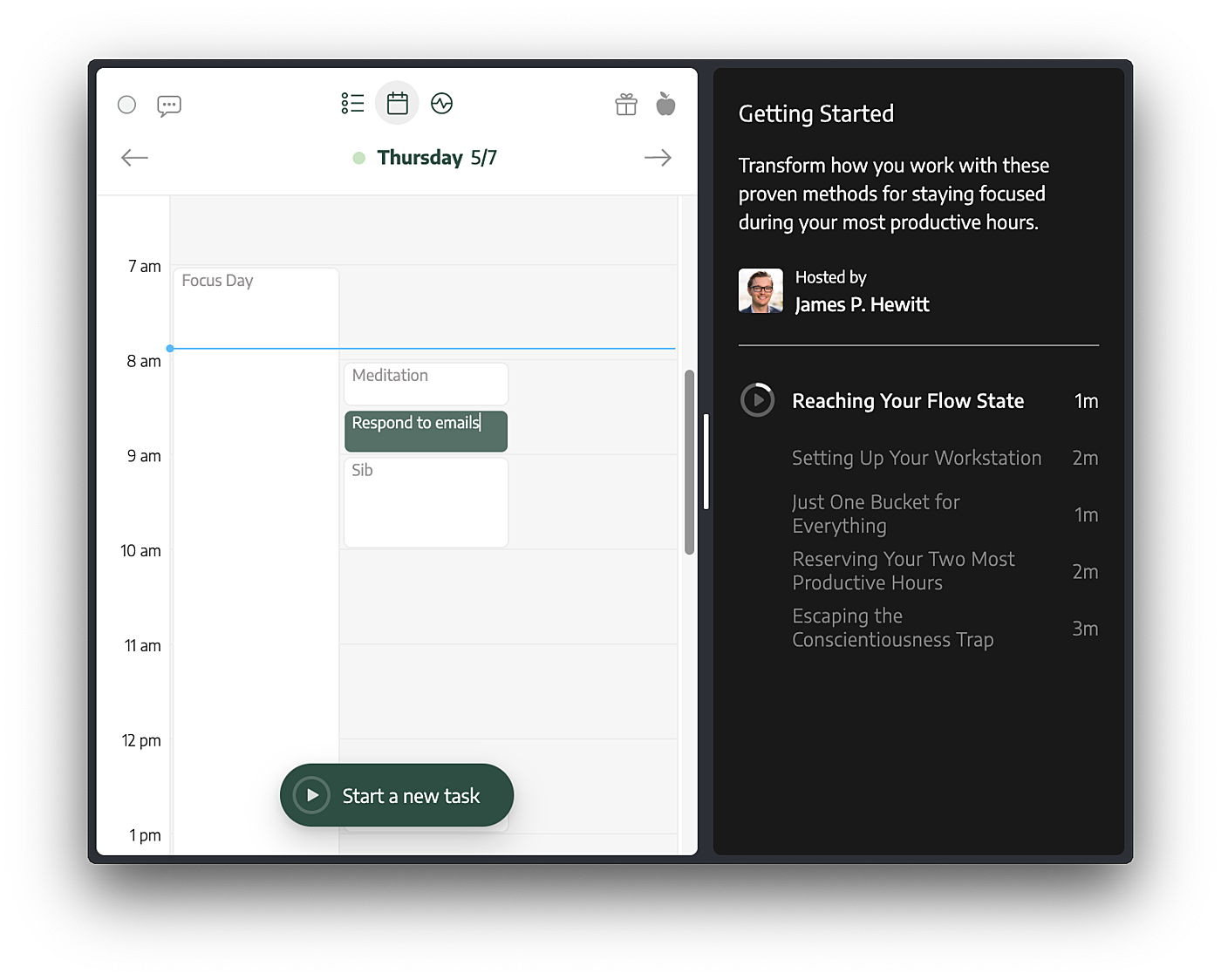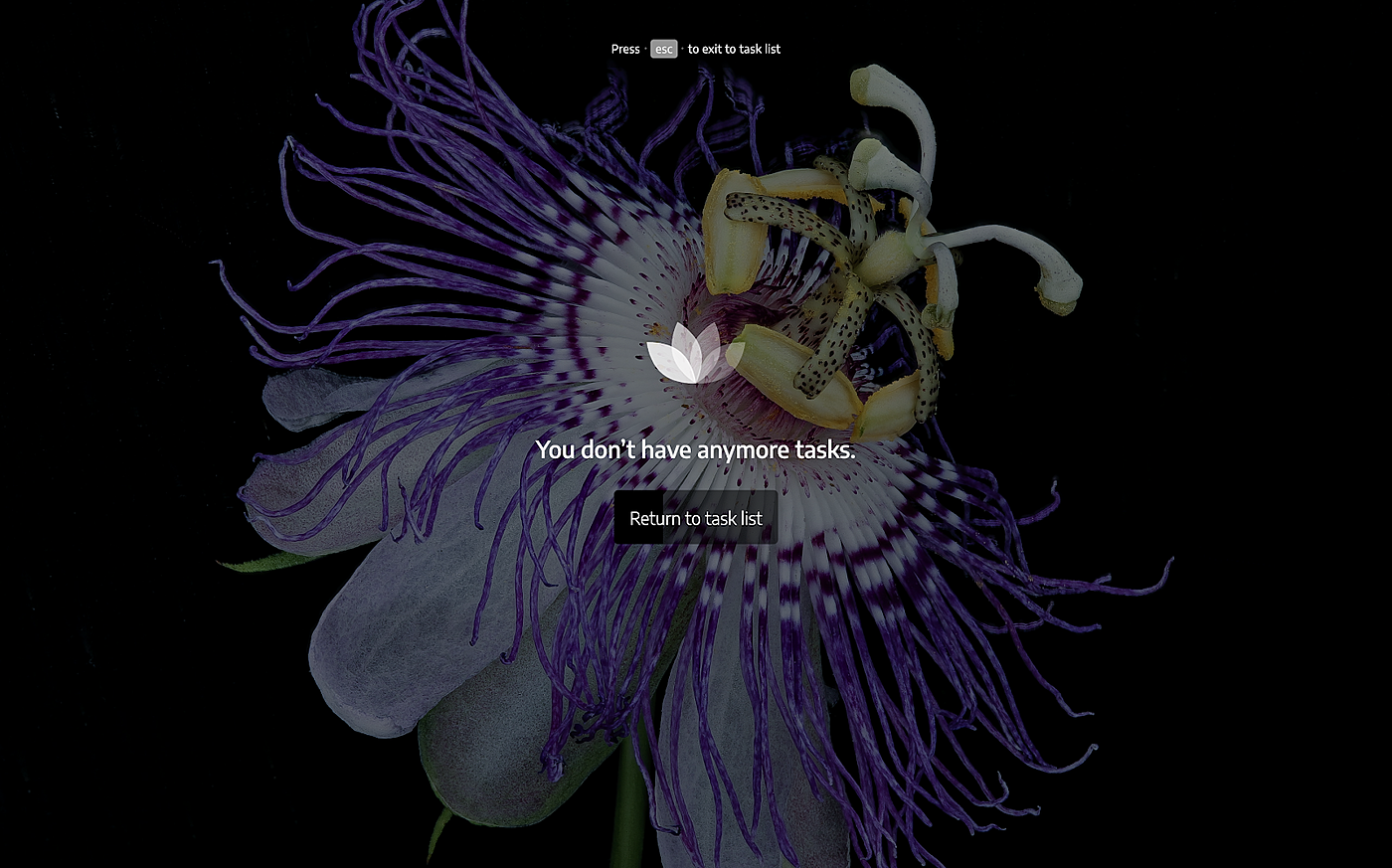
Review: Centered.app
The mindful todo list app that's been keeping me focused this week
May 6, 2020 · Updated February 13, 2026
“Are you still on task?” my digital productivity assistant asks me.
I Alt+Tab from my guilty Slack channel back to my open Google Doc. The page is blank. The cursor smirks at me in between blinks.
“Welcome back,” my assistant intones in a smooth British accent. I check the progress bar on my current 25 minute sprint. Less than 10% of the way there.
I feel the urge to check Twitter, but then think better of it. Centered.app is watching, and I don’t want to let it down.
I plow ahead.
. . .
Centered.app pitches itself as a mindful todo list, and it has a bunch of ideas that are extremely compelling.
When you open the app you’re presented with a list of todos for the day. Each todo, aside from getting a label, also gets an amount of time associated with it.
This is an important concept — time is the main work input that we can control, and so forcing you to think of todos in units of time can help you be more realistic about how much you can get done.
It also helps to eliminate some of the clutter that comes with using digital todo apps. You probably won’t record a task that will take you 5 seconds.
There is also a calendar view so you can schedule your todos throughout the day.
It’s something we’ve seen before — Dan Ariely’s Timeful did something similar back in the day — and s̶t̶u̶d̶i̶e̶s̶ my personal anecdata show that putting a task on the calendar can help increase the chances it actually gets done.
But what’s really interesting is that Centered isnt’t just about checking off todo items when you’re done with them. At the bottom of the screen it has a “Play” button — that allows you to start a task.
When you hit play on a task, Centered turns itself into a little mini-player that reminds you what your task is, how much time is left, and how long you’ve been focused on the current application.
It also starts to play rhythmic ambient jungle music in the background to help you focus. It works for me most of the time. It reminds a little bit of Focus@Will (of which I am a paying customer) but with a less diverse selection of music.
But that’s not all this watchful little widget does. It’s also working to make sure you’re focused.
If you switch from, say Google Docs, to Slack, or iMessage the rhythmic ambient jungle music pauses and the smooth British voice interrupts:
“Are you still on task?” it asks.
More often than not, I am not on task and this is a welcome reminder. Then, when you finish the task and mark it as complete, Centered.app takes over your screen, and shows you a pretty picture:
Then the British voice comes on again:
“When you hear the chime let yourself feel gratitude for the work you did. Chime!”
This is nice, because I do want to take a moment to feel gratitude for getting something done rather than just plowing on to the next thing (which is my default.) And it’s nice to have a piece of software to support a habit like that.
Centered is trying to make sure you both get things done and you feel good about it.
So what’s not to like?
. . .
I’ve been using Centered.app for about a week. I’m getting more done, and I’m more focused. But something about its current incarnation is bothering me a little bit.
There are these little moments that are just kind of annoying.
For example, if I’m in Google Docs and I switch to Slack to genuinely look something up for a piece I’m writing — the music will pause and it will ask, “Are you still on task?”
I’m actually not distracted, and I feel like I’m being accused. This is kind of insulting. And I’m not used to being insulted by software.
Or, if I’ve had a bad work session and I finally hit the done button it will show me a pretty picture and tell me to feel gratitude for getting something done. But it’s hard for me to actually feel gratitude — it was a tough session, and it feels like Centered doesn’t really get that.
That’s where I think an app like this needs some work.
When you first start using it, it’s exactly what you want — it keeps you focused and on task, and it becomes a regular part of your routine. But over time these little things happen that make you lose trust a little bit.
You feel like you don’t want to invest emotionally in the app because it will ding you for doing something wrong even when it shouldn’t, or ask you to feel a feeling that you don’t actually feel. It’s assuming too much, and it's too often wrong.
In short, it can’t read the room.
It’s kind of like a new friend that you’re absolutely fascinated with at first, but then over time the same things that made them awesome slowly start to annoy the shit out of you.
I think in order for apps like this to succeed they have to have some way of getting feedback from the user that lets them know: “Maybe I shouldn’t annoy you right now.”
One way to do this, is to make accusations about distraction more slowly. For example, when I switch to an app that might be distracting, instead of interrupting the music and immediately accusing me with a voice — what if the widget changed color slightly? Maybe it slowly starts going from green to red, and bounces back quickly if I move back to the task at hand?
If I really stay off task for a few minutes, then maybe the voice comes in to really ding me.
Doing it this way makes it easy to gather feedback from the user. When it starts to go red, it can display a little button that says “Mark this app as not distracting” — so that I can tell Centered not to ding me, and I don’t hear the dreaded voice.
Centered actually already has this button — a little moon-shaped snooze button on the widget — but it’s hard to find, and because it shows up only after the voice has accused me, it’s not super useful.
The verdict
In sum, I generally dislike negative reviews of apps because it’s always easier to criticize something than it is to actually make the thing.
So I’d consider this constructive criticism: it’s a good app, with good ideas — but in order to be something I use forever, I think it needs to do a better job at understanding how I’m actually feeling.
It needs to be able to read the room.
Get the Centered app
You can download the app here.
Cost: $10 / month
What did you think of this?
I’ve never done a tool review before. Did you like it? Did you hate it? Help me make Superorganizers better by clicking “like” or leaving a comment!
The Only Subscription
You Need to
Stay at the
Edge of AI
The essential toolkit for those shaping the future
"This might be the best value you
can get from an AI subscription."
- Jay S.
Join 100,000+ leaders, builders, and innovators

Email address
Already have an account? Sign in
What is included in a subscription?
Daily insights from AI pioneers + early access to powerful AI tools















Comments
Don't have an account? Sign up!